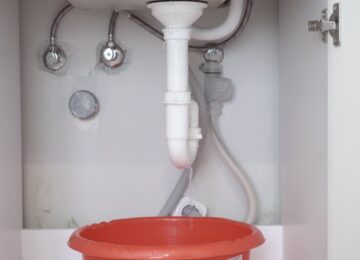A smelly shower drain is more than just a minor nuisance; it’s often a sign of a plumbing issue that could lead to bigger problems if ignored. Homeowners in Connecticut and New York frequently deal with unpleasant odors wafting from their bathroom drains, especially in older homes or during seasonal humidity shifts. That distinctive rotten egg or musty smell coming from the drain isn’t just annoying; it could mean bacteria, gases, or stagnant water are lingering where they shouldn’t be.
Understanding why your shower drain smells is the first step toward addressing the issue efficiently. In many cases, it’s due to simple buildup that can be fixed with regular cleaning. But in other situations, it may signal a deeper problem like a faulty P-trap, vent pipe, or even a cracked sewer line. If left untreated, these issues could lead to water damage, mold growth, or even exposure to harmful gases like hydrogen sulfide.
Let’s take a deeper look into the most common reasons your shower might smell and how you can fix or prevent them, whether you prefer to DIY or need help from a professional plumber.
What Causes a Shower Drain to Smell?
A smelly shower drain is often caused by bacterial buildup, stagnant water, or improper ventilation in the plumbing system. Common causes include clogged pipes, dry or dirty P-traps, biofilm buildup, and, in some cases, leaking sewer lines or vent issues that allow gases to enter your home.
Knowing what’s behind that smell helps you choose the right fix. Here’s a breakdown of the most likely culprits:
Clogged or Dirty Drain
Clogs are one of the most frequent causes of drain odors. Over time, soap scum, hair, dead skin cells, and other debris accumulate under the drain cover, forming a blockage that traps water and bacteria. As these organic materials decay, they release foul smells, especially in warm, moist environments like a shower.
If your shower drain smells and the water drains slowly, you’re likely dealing with a clog. These can sometimes be cleared with boiling water or a drain snake, but if buildup is severe or persistent, professional drain cleaning services may be necessary.
Dry or Dirty P-Trap
The P-trap is a U-shaped pipe below your shower drain that’s designed to hold a small amount of water. This water barrier keeps sewer gases contained and prevents them from backing up into your bathroom. If the trap dries out due to infrequent use, improper installation, or a leak, you’ll smell hydrogen sulfide, a distinctive rotten egg odor.
A dry P-trap is often the cause when a bathroom has been unused for a while, such as a guest bath. To fix it, simply run the shower for a few minutes. If that doesn’t solve it, you may be dealing with loose fittings, leaky pipes, or a damaged trap, which should be inspected by a licensed plumber.
Biofilm Buildup
Biofilm is a glue-like substance formed by colonies of bacteria feeding on organic matter. This slimy layer develops on the inner walls of drainage pipes, especially when there’s consistent moisture and warmth. As the bacterial waste builds up, it emits musty smells or sewage-like odors that cling to your shower walls and drain.
Removing biofilm takes more than just a quick rinse. You’ll need a deep cleaning approach, either with enzyme-based cleaners, baking soda, or vinegar, or mechanical scrubbing with a drain brush.
Mold or Mildew in the Drain
If the smell is more musty than sewage-like, mold or mildew might be the issue. Showers create the perfect environment for mold spores to thrive, moist, dark, and full of organic material. Over time, this can grow not just inside the drain but also behind bathroom walls, where hidden moisture persists.
In addition to cleaning the drain, check for signs of water damage or mold outside the plumbing system, especially around the tub, tiles, or walls.
Vent Stack or Sewer Line Problems
In more serious cases, a bad smell may indicate problems with the ventilation system or a damaged sewer line. Plumbing vents allow gases to escape and help regulate pressure in the drain line. If a vent is blocked by debris, bird nests, or ice during winter, it can cause gases to back up into the bathroom.
Likewise, a cracked or leaking sewer line might allow sewage to seep into the surrounding soil and leak odors into the home. These are not DIY issues and require immediate attention from a plumber who can diagnose and fix the root cause with video inspections or pipe repair solutions.
How to Fix a Smelly Shower Drain (DIY Solutions)
If your shower drain smells, there are several safe and effective fixes you can try before calling a plumber. These home methods can eliminate odors caused by buildup, bacteria, or dry traps. However, if the smell keeps coming back, a deeper issue may be at play.
Flush with Hot Water and Dish Soap
Start with a simple flush. Pour boiling water mixed with a small amount of dish soap down the drain to break down grease and dislodge soft debris. This method is quick, affordable, and safe for most pipe materials.
Use Baking Soda and Vinegar
This natural combo triggers a chemical reaction that helps clean grime and eliminate odor-causing bacteria. Here’s how:
- Pour one cup of baking soda into the drain.
- Follow with one cup of white vinegar.
- Let it fizz for 10–15 minutes.
- Rinse with hot water to wash away loosened material.
This technique is ideal for handling biofilm buildup or light clogs without using harsh chemicals.
Refill the P-Trap with Water
If you haven’t used the shower in weeks and your P-trap has gone dry, simply run water for a few minutes to restore the barrier. You can also pour a small amount of mineral oil down the drain afterward to slow evaporation.
Use a Drain Brush or Snake
Physical tools like a drain brush or drain snake are helpful for removing clumps of hair, soap scum, and other debris stuck in the pipe. Be gentle to avoid damaging the trap or dislodging important components.
Try an Enzyme-Based Cleaner
Unlike chemical products, enzyme-based cleaners target organic waste, making them ideal for clearing biofilm and reducing unpleasant odors. Follow the product directions and use overnight for best results.
When to Call a Professional Plumber
If you’ve tried cleaning and the smell persists, it’s time to consult a professional plumber. Some issues simply can’t be solved with home remedies.
You should contact a plumber if:
- You smell rotten eggs despite a full P-trap
- The drain backs up or bubbles during use
- You suspect leaking pipes or see signs of water damage
- Odors return shortly after cleaning
- You live in an older home and haven’t had the pipes inspected
At All State Plumbing Pros, we offer 24/7 emergency plumbing services in Fairfield County, CT, and Westchester County, NY. From well pump repairs to sewer line diagnostics, our licensed professionals deliver lasting solutions with clean, respectful service.
How to Prevent Shower Drain Odors
Regular maintenance is the best way to avoid smelly drains and keep your bathroom smelling fresh. Preventative steps not only reduce odors but also extend the life of your plumbing system.
Here are a few simple habits to adopt:
- Use a drain strainer to catch hair and debris
- Flush with hot water weekly to reduce buildup
- Clean the drain cover and opening monthly
- Use enzyme cleaners every 2–3 months
- Schedule a professional inspection annually, especially in older homes
These proactive measures will help you stay ahead of plumbing problems before they create expensive or unhealthy conditions.
Shower Drain Odor Troubleshooting Table
| Smell Type | Likely Cause | Quick Fix | Call a Pro? |
|---|---|---|---|
| Rotten eggs | Dry P-trap or sewer gas | Refill trap, check for leaks | If smell persists |
| Musty/mildew | Mold in drain walls | Scrub, disinfect, improve airflow | Not always |
| Foul decay smell | Hair & biofilm buildup | Baking soda + vinegar, brush | Optional |
| Reoccurring smell | Leaking pipes or vent issues | Inspection and repair | Yes |
Conclusion
A smelly shower drain may seem like a minor inconvenience, but it often signals bigger plumbing issues, from biofilm buildup and dry P-traps to potential sewer line or ventilation problems. By understanding the most common causes and applying safe DIY fixes, you can often restore a clean, odor-free bathroom. But if the smell keeps returning or you notice signs of leaks, slow drainage, or unusual gurgling, it’s best to call in a licensed professional.
At All State Plumbing Pros, we’ve helped homeowners across Fairfield County, CT, and Westchester County, NY solve persistent drain odors quickly and affordably. Whether you need an emergency repair or a long-term solution, our team is available 24/7 to get your home back to normal.
Don’t wait for the smell to spread. Contact us today for expert, honest plumbing service you can count on.
FAQs
What is the most common cause of a smelly shower drain?
The most common cause is organic buildup from hair, soap, and debris that sits in the pipe and decays. This creates a feeding ground for bacteria, which emit odors as they break down the waste.
Can I use bleach to clean a smelly shower drain?
While bleach can kill some bacteria, it doesn’t dissolve clogs or remove biofilm effectively. Over time, it may also damage older plumbing. Safer options include baking soda, vinegar, or enzyme-based cleaners.
Why does my shower drain smell like rotten eggs?
That rotten egg smell usually indicates hydrogen sulfide gas, which forms when a P-trap is dry or when sewer gases leak through damaged plumbing. Restoring the trap or sealing leaks can solve the issue.
How often should I clean my shower drain?
It’s best to clean your shower drain monthly using hot water or a natural cleaner. Use a drain strainer to catch hair and reduce buildup in between cleanings.
Why does the smell return after I clean the drain?
If the smell comes back soon after cleaning, there may be a deeper issue like a leaky pipe, damaged vent, or cracked sewer line. A professional inspection can uncover the root cause.

![Why Does My Shower Drain Smell? Common Causes & Fixes A smelly shower drain is more than just a minor nuisance; it’s often a sign of a plumbing issue that could lead to bigger problems if ignored. Homeowners in Connecticut and New York frequently deal with unpleasant odors wafting from their bathroom drains, especially in older homes or during seasonal humidity shifts. That distinctive rotten […]](https://allstateplumbingct.com/wp-content/uploads/2025/08/Why-Does-My-Shower-Drain-Smell-Common-Causes-Fixes-750x420.jpg)



Leave a Reply